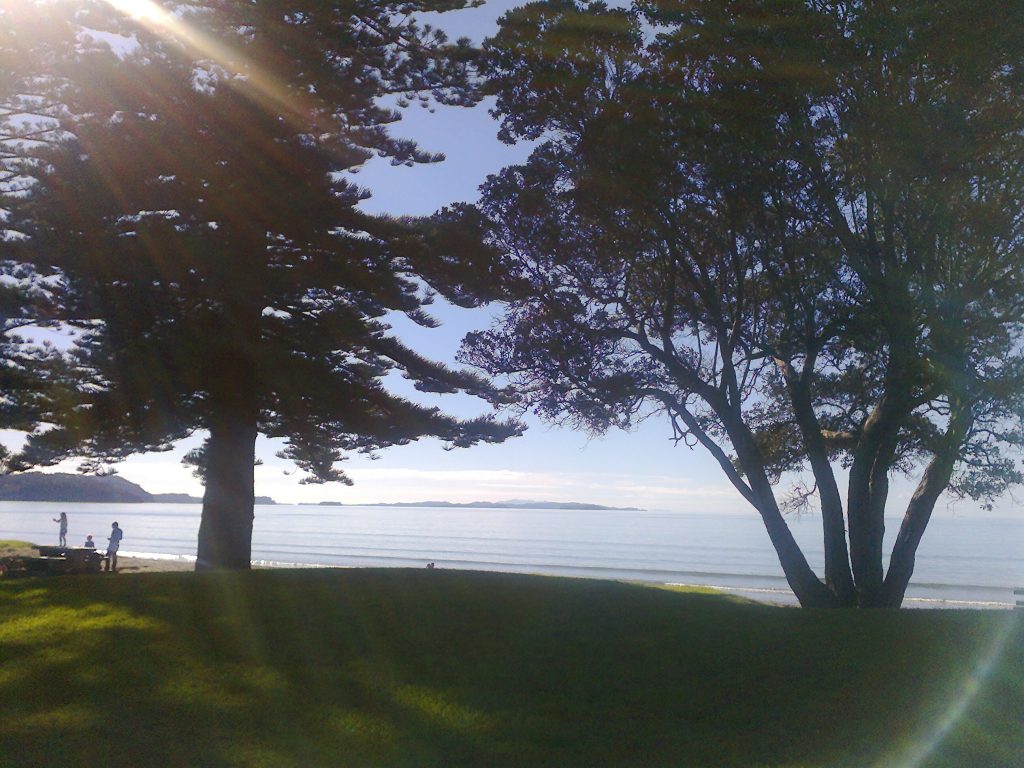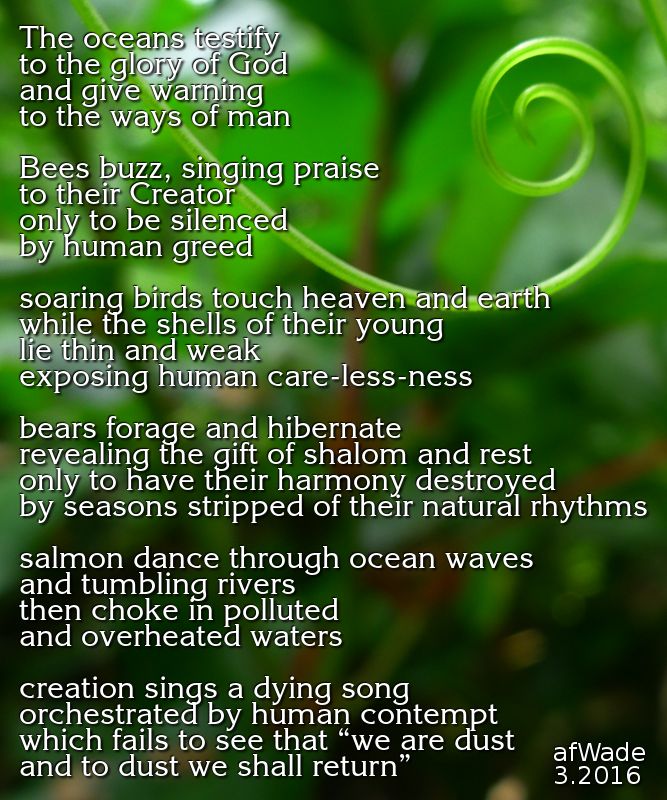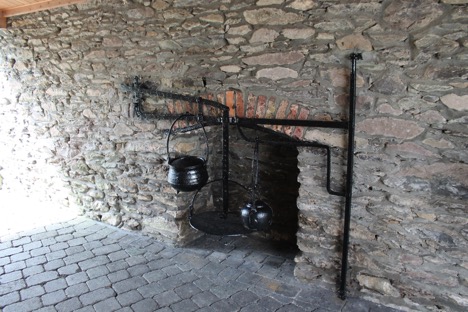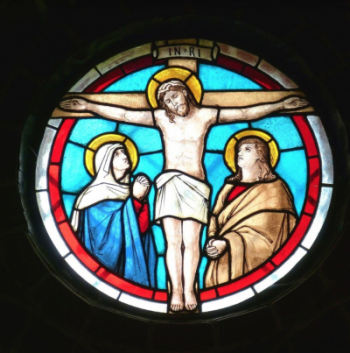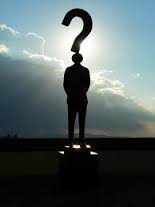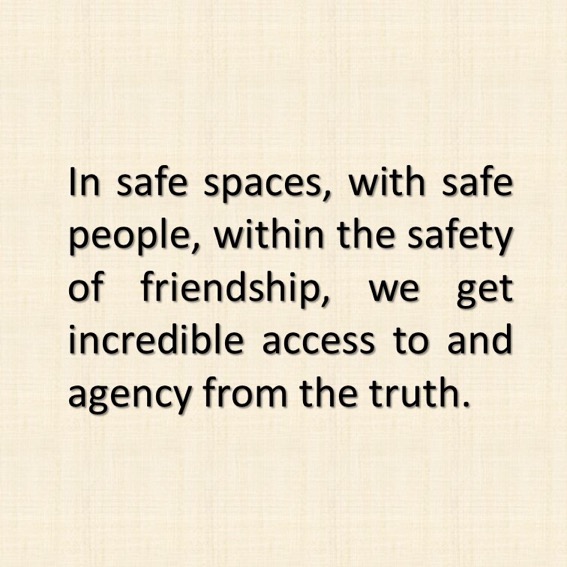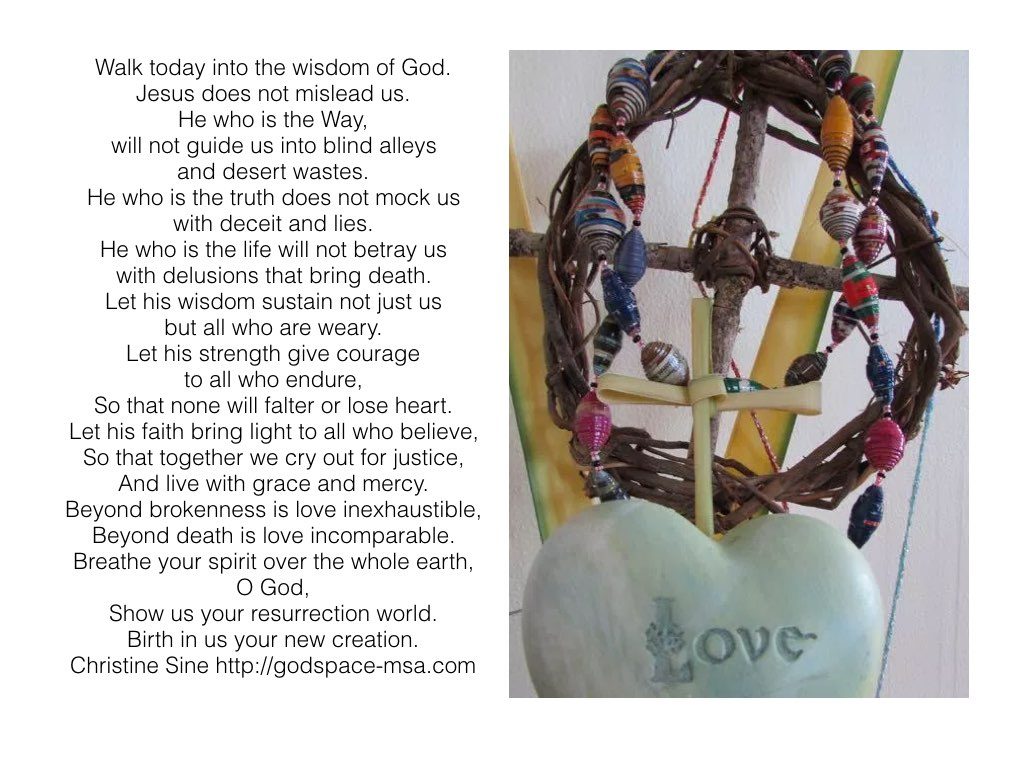It’s always amazing to me how each Resurrection Sunday I am affected anew, freshly struck with the wonder of Easter Sunday, as though I am standing there 2000 years ago, Jesus having just risen, and the tomb only empty a few hours. As though I have only just heard of Jesus meeting the disciples on the road to Emmaus, or showing the disciples the wounds in his side and palms. The story of Easter comes alive for me again as I re-enter it, and I think as Christians we share this special remembrance, but have our own unique ways of experiencing it. Yes, it becomes a very personal thing on Easter Sunday, our faith; despite our knowing that Christianity is a universal religion that we share, and though we may reflect with others during Holy Week, Easter Sunday is very much about the risen Lord and what it means to us as individuals. The Holy Spirit, the Spirit of Truth causes the knowledge to come upon us afresh, reminding us how Jesus’s ascension to heaven affects us personally, intimately, in terms of our journey and relationship with God. Knowing our lives without Jesus would never have been the same, we respond with rejoicing, cherishing the knowledge close to our hearts. Just like Mary in Luke 2:19 ‘treasured up all these things and pondered them in her heart’, we after his death and celebrating his resurrection, ponder what his life means to us, and world around us; and we see everything afresh, in the light of the resurrection story.
A Love Story
It’s a love story.
As all good lovers know
there is a blueprint to follow,
for a love story
to ring true.
And Your love for us
is the love of a lifetime,
an eternity even,
from the beginning,
of time, to amen.
Your love for us
exists in every note,
of all the lovers’ ballads,
which man has ever yet
composed.
Oh yes, Your love, for us
lies woven in every story
ever told,
which spoke of daring,
and of loss,
and triumph after all.
Yes, Your love, for us
is in the hearts, of everyone –
of all who love
wholeheartedly,
only to have to go on alone.
For Your love, in truth
is lived out by us.
In all of us,
who behold Your story,
and allow it to determine our part.
From the cradle
to the cross;
from time’s beginning
to Your sacrifice,
and its final accomplishment.
We wait, and we trust
and we know just a little
of what it is to love
truly,
because you’ve shown us.
What it means to come and give up,
to lose what can’t be kept,
to gain what can’t be lost.
Ana Lisa de Jong
“all those who have waited with love for him to come again will receive a crown.”
2 Timothy 4:8
By Andy Wade
Like a river flowing to the ocean only to be evaporated, return to the sky, and fall as rain, all of life has a cycle. For each one of us, indeed for the whole creation, there is life flowing from the hand of God, navigating the landscape of life, death, and returning to God.
Last week we explored darkness and death. What a depressing and terrifying thing if that’s the end of the story. But we know it’s not the end. This week as we prepare for Resurrection Sunday, we delve into the reality of a vacant cross and an empty tomb.
These two contrasting images, death and life, swirl in my mind. So much of life can be understood as a running away from or denying the reality of death. Yet creation testifies that there is much more. Like the seed buried in the earth only to spring to life and emerge as a beautiful flower, so it is with us. We will die, but we will also rise again! In the Eucharistic liturgy of the Episcopal Church these words are recited every Sunday:
Christ Has Died
Christ is Risen
Christ Will Come Again
Even in the cycle of God’s salvation there is death and new life.
However there is another side to all of this. God placed us in the garden to till and to keep it. We are both part of creation and the caretakers of creation. To us belongs the profound gift and holy responsibility of ensuring the whole creation continues its God-breathed cycle of praise and worship through the act of living and dying and living again.
But “we have done those things which we ought not to have done, and we have left undone those things which we ought to have done.” Having imposed our lustful appetites for more onto creation, we have disrupted the sacred dance of creation.
It is a constant challenge to hold together the mysteries of death and resurrection. Our tendency is to emphasize one over the other as we craft a theology that makes us a bit more comfortable.
Yet it is precisely this balance we must hold in our hands each day. Wherever we look we see signs of both life and death. And, if we are paying attention, we realize that our actions also reflect the power of life and death in the whole creation around us.
Expectantly I wait for resurrection. And as I wait I notice that creation is crying out. Creation testifies against me as it desperately attempts to gain my attention. “While you proclaim resurrection”, creation accuses, “you crucify the very nature that God formed into life and entrusted into your care!”
That may seem extreme to some. But the seasons of earth are a gift from God reminding us that we are all part of this dance of life, death, and resurrection. The song creation sings is a prophetic song of worship. Each fall it reminds us that we too are created, we too will die and return to the earth. But in the spring it reminds us that resurrection is always just around the corner. New life will break through the muck and mire, first a shoot, then a branch, and suddenly before we realize it, a tree so large the birds make their home there.
What are the everyday signs of resurrection around you?
What are the normal reminders of natural death that lead to resurrection?
Where do you see abnormal death around you? How might creation be warning you to change your ways?
This fireplace and cooking area (in Dingle, County Kerry, Ireland) makes me think of the fire around which Peter and the crowd of people huddled as Jesus was “examined” by the High Priest in the wee hours of the night. Good Friday is a day where we are called to “walk with Jesus” as he moves through torture and harassment by the guards through a kangaroo court with Annas, Caiaphas, Herod, and even Pilate, finally to the cross and tomb.
Throughout my years of ministry, I have led or been a part of a variety of Good Friday observances. They have ranged from full-scale recreations of Jesus’ last day to a liturgy of hymns and scripture lessons. As Rowan Wyatt asks in the title of his article for Good Friday, “What’s so Good About Friday?”, I believe that we often are in such a hurry to get through Holy Week to Easter Sunday, that we forget to stop and ponder the significance of Holy Week.
I have to admit, as a pastor (and previously as an Air Force Chaplain) I find myself so caught up in all of the special worship services (from designing to leading them) that by the time Good Friday rolls around my mind is set on preparation for Easter Sunday. A perfect example of this is the fact that it is Monday of Holy Week and I am just now getting around to writing an article about Good Friday after first preparing the Bulletin for our Easter Sunday service at Presbyterian Community Church of the Rockies!
On Palm Sunday I encouraged myself and my congregation to be the voice of Christ for the voiceless or else Christ would call the very stones that make up the Rocky Mountain National Park to start speaking out. Can you imagine the noise that the Rocky Mountains could make? Wow! A part of that encouragement was to slow down and truly focus on what Holy Week and the last week of Jesus’ earthly life was truly all about. As we hiked in the Rockies on Sunday afternoon, I found myself having to slow my mind down. I guess that was a precursor to what we are called to do during Holy Week.
On Good Friday my challenge will be to truly walk with Jesus and the disciples and the women through that day. The challenge will be to do more than lip service to the day in our Ecumenical Good Friday Service in town. Perhaps I need to slow down and spend some time sitting quietly before the symbolic fire as Peter did and ask myself the simple question he was asked. “You are one of them aren’t you? Don’t you know him?” And if I know him, am I willing to speak boldly for the widows, orphans, and voiceless in his name? Or am I going to leave that job to the Rocks!
By Rowan Wyatt
I remember at school during an R.E. lesson being incredibly confused by the notion of ‘Good Friday’. I walked up to the desk behind which sat Mr. Purcer our chain smoking, alcoholic Religious Education teacher, he eyed me warily as I approached, expecting mockery. He looked at me from behind glasses which partially hid eyes showing signs of having given up, and said with a slight sigh, “Yes, Rowan”?
I asked what was to be one of the most profound questions I had ever asked, for as an angry child of 14 I had no idea of faith. “What’s so good about Friday if Jesus was murdered on that day? Shouldn’t it be called Bad Friday?”, I asked earnestly. Startled by being asked an interesting question for a change he sat me down and ignoring the near rioting going in in the rabble filled classroom, proceeded to explain to me, for half an hour, what was meant by Good Friday.
The whole thing was laid out for me. No vicar, pastor or Christian had ever taken the time to explain what happened on that day, high on the splintering wooden gallows and what it meant for me, FOR ME! Up till that point nothing had been done for me. My Family didn’t want me, my only friends were books and my beloved Grandfather had recently died. But I learned that day that someone loved me enough to die for me, FOR ME! Not only that, I was no longer alone for he was always with me and loved me, LOVED ME!!
So Good Friday finally made sense. I pray it finally gets to make sense for the rest of the world which is as riotous as that classroom where I finally learnt what it meant.
On the Cross R.R. Wyatt
The sound of hammer on nail
Still reverberates around the hill
As your head sinks to your chest
Your last breath gone
And a single raindrop falls.
A tear from God as his son
Gives way and leaves his sight
The tortured bloody frame
Hanging in shame
A victim of our iniquity.
The sky blackens and seethes
As the rain begins to fall
Cleansing the torn limp body
Washing it clean
Sluicing the blood to the earth.
A crack of thunder resounds
And the gathered scatter afeared
Just a few remain, bearing witness
To a beloved’s death
Yanked with indignity from the wood.
And the storm in its ferocity wails
Cracking deep the temple in rage
With a grief profound as truth
As the lamb slain
Is taken to a tomb, for a while.
© Rowan Robert Wyatt 2015, Taken from the forthcoming poetry volume, Lux Aeturna
By James Prescott
When we speak of lent, we often think about what we’re giving up. Whether it’s the bog standard chocolate (which was one of the things I did give up this year, by the way) or TV, or Netflix, or some other sacrifice we’re making – it’s often described simply in those terms.
However, this year, when deciding how to approach lent, I felt differently. It appeared to me that this was more than simply setting something down for a season to remind me what was important. It was deeper this year. I gave up Netflix, chocolate and junk food, not simply to give something up. But because I wanted to replace them with something better.
I wanted to spend more time reading – books, and above all the Bible. I wanted to be physically healthier. In other words, I was trying to get rid of garbage which was stopping me from living a healthy life, and embrace habits which would allow me to live the vibrant life God has for me.
In essence, I was putting to death old habits, and attempting to let new ones rise up from their ashes.
Because this time, with Lent I didn’t simply want it to be about giving up something because I should. I wanted it to be for something. To serve a purpose. To be something I was participating in, which would transform me, and lead me closer to God.
If we’re to participate in Lent, there has to be a purpose to it. It has to be about a way we connect both with the divine Himself, but also with who He wants us to be – indeed how we already were, but didn’t see – and how He created us to be. And this applies both individually and corporately.
Because it may be there are things about us – talents, passions, callings – we’ve simply not seen, or have blinded ourselves to.
And as we participate in Lent more fully, and make sacrifices with a purpose, choose a new habit instead of the one we gave up – we give God space to reveal more of who we already are, so we can pursue the life He has for us.
My hope for you – and for myself – this Lent is that we discover more of God, deepen your relationship with Him, but also that we discover more who we are and how God made us to be.
That way, we can begin to take action to make God’s dreams for us a reality.
Maundy Thursday, the Celebration of Friendship
PRESENCE is a word that has connotations of being present, visible, noticeable, and active. Yet God’s Presence has something mysterious about its otherness.
God’s Presence was richly felt when a collection of spiritually close friends met at our home recently for an evening meal. Much humour was shared before the meal, much hospitality was enjoyed during the meal, and much humility was shared after the meal.
Having set the scene in the meeting and in the eating, we dug deep into the nuances of being broken sinners serving a perfectly holy God. Many fleeting silences punctuated our time, as we considered the struggles dealt to each of us six (three couples), amidst the grace of the Spirit that urges us on. Tough questions were asked, and, because we’re sincere friends, graciously honest answers were ventured in vulnerability. Intimacy was felt, and shared. What was beneath these tough questions? A wishing-well and a wanting-for-the-best motive. Emotions tipped over occasionally where topics approached loss, guilt, and shame. And still there was much affirmation.
In safe spaces, with safe people, within the safety of friendship, we get incredible access to and agency from the truth.
Vulnerability and realness were the order of the evening.
Then we prayed.
We prayed aloud and we prayed silently. Tears flowed, yet there too was the laughter of giggly joy. We were free to be. Some of these moments were palpable. God was there, in our midst. His Presence, there, guiding our thoughts, informing our prayers, generating our love, by His Spirit.
We prayed not for the past, but for the present and future. We prayed prayers of intercession over one another. We prayed with the laying of hands. And we allowed God’s Presence to touch us, to minister to us, and to heal us. We were real and vulnerable. And God had His way. We brought a precious few hours of heaven to earth as we delighted in being in the lap of God’s will. None of us left the same.
This night, where precious friendships were established, formed and consolidated, reminds me of the Last Supper, where Jesus held court. It was where God’s Presence was actually with the disciples as they communed, blissfully unaware of what was about to take place.
Tough things were said, there (John 13:21-30; 36-38; 15:18). The disciples grappled with what the Lord had to say. In many ways they were still clueless. But a genuine love was shared at that table. They broke bread. They drank wine. And they prayed; God’s Presence no doubt touching the disciples as Jesus prayed his unifying prayer of John 17. There must have been a crescendo of emotion. Realness with vulnerability.
Realness with vulnerability, in community, is truth regaling in love.
Maundy Thursday, or Holy Thursday, is the occasion for retreating with friends, to rejoice in fellowship, relax over a meal, and to relate with our good, good Father through the connectivity of prayer. To, in some way, re-enact the community of the Last Supper.
Our Christianity is empty when void of community.
Community adds to us the truth of life, of hope, of support, and of healing. From community come the essences that give meaning to life. And it’s in community that we come to be formed and are able to grow as God intended from the beginning.
In community, we’re able to reflect on the manifold wisdom of Easter that blows our minds and breaks our hearts for the manifest goodness and greatness of God.
I wrote this prayer for Good Friday last year, but as I grieved today over the devastation in Brussels and the many places of pain and suffering around the world I found it coming to me again. We wonder why does God allow such heartache? Why does God not intervene?
As I sat contemplating the events of the last day of Jesus life, I was struck as never before by the confusion, disillusionment and betrayal that Jesus followers must have felt as they watched him walk through his final hours. God was not responding to their dreams and hopes in the ways they expected. The powerful Messiah they had hoped for became instead a humble servant. The one they thought would be crowned as king was crowned instead with thorns. Crucified not worshipped. Spat upon and disgraced.
Today many of us suffer the same disillusionment. Every time we turn around there is another report of chaos, death and suffering. We live in a broken world that desperately needs a saviour, but can a dead messiah who washed feet and welcomed lepers possibly be the Way, the Truth and the Life? Can this Jesus really be the One our hearts long for? Today’s prayer comes out of these reflections
Walk today into the wisdom of God.
Jesus does not mislead us.
He who is the Way,
will not guide us into blind alleys and desert wastes.
He who is the truth
does not mock us with deceit and lies.
He who is the life
will not betray us with delusions that bring death.
Let his wisdom sustain not just us
but all who are weary.
Let his strength give courage to all who endure,
So that none will falter or lose heart.
Let his faith bring light to all who believe,
So that together we will cry out for justice,
And live with grace and mercy.
Beyond brokenness is love inexhaustible,
Beyond death is love incomparable.
Breathe your spirit over the whole earth, O God,
Show us your resurrection world.
Make us your new creation.
How do you respond when Jesus the Messiah does not come up to expectations of what the saviour of the world should look like?
As an Amazon Associate, I receive a small amount for purchases made through appropriate links.
Thank you for supporting Godspace in this way.
When referencing or quoting Godspace Light, please be sure to include the Author (Christine Sine unless otherwise noted), the Title of the article or resource, the Source link where appropriate, and ©Godspacelight.com. Thank you!

